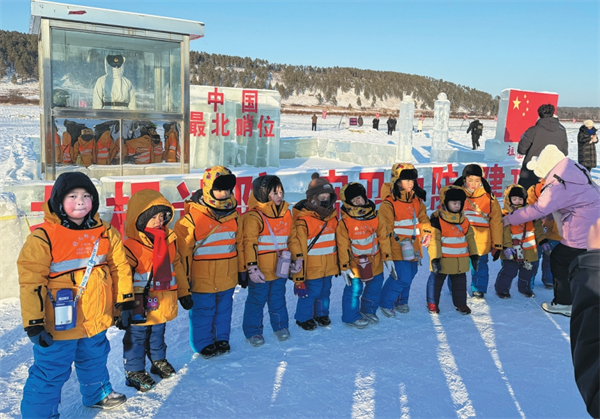Home>Harbin Today
North China cuts large cultural deal in the South
Updated : 2015-05-15
By Fang Sha ( e.my399.com )
The city of Harbin, capital of Heilongjiang province took part in the 2015 China (Shenzhen) International Cultural Industry Fair, on May 14, in the mega-city of Shenzhen, Guangdong province on the Hong Kong border, to promote investment in its culture industries and managed to nail down 3.6 billion yuan ($580 million) worth of contracts.
These contracts, which covered online educational programs, financing international cultural exchanges, and film and TV products, represented the largest amount out of Harbin’s three appearances at the annual Shenzhen, going back to 2012. It had more than 60 projects in all this year, in publications, distribution, culture, arts, cultural information, and cultural recreation and entertainment.

Foreign visitors get a look at Harbin culture products, at the China (Shenzhen) International Cultural Industries Fair, in Shenzhen, on May 14. [Photo/my399.com]
This year’s fair attracted hundreds of domestic culture enterprises and representatives of companies in Russia, Mexico, Spain, Belgium, Pakistan, Turkey, Nepal, Nigeria, Bengal, Congo, Senegal, as well as Hong Kong, Macau, and Taiwan.

Harbin pavilion show with a theme of ice and snow, at the Shenzhen culture fair, on May 14. [Photo/my399.com]
Some enterprises looking for more business ties with northern China had live exhibits at the Harbin section, including the Heilongjiang New Ocean Technology Co, Harbin Cultural Property Exchange, Harbin International Oil Painting Trading Center, Heilongjiang E-Link Network Stock Co, Harbin Hua Tan Sino Russian Gem Culture Park, Harbin Wanxiang Expo City, and the Spanish Link2u Co, Senegal IBS International Business Service Co, and a Mexican company.
Harbin has had 54 cultural projects in all at the Shenzhen fair, worth 9.85 billion yuan, which have helped its culture industry a lot, bringing added value of 17 billion yuan in 2011, to 32.5 billion in 2014.

Harbin ramps up childcare services
A new comprehensive service center for childcare in Harbin is expected to be finished by the end of the year.
-
Talent policies drive enterprise development in Harbin
Harbin's "30 New Talent Policies" represents an iterative upgrade to the talent policy system, helping attract and retain talent to bolster economic and social development.
-
Official website of 2025 Asian Winter Games goes live
Harbin, the host city of the 9th Asian Winter Games, has announced that the official website for the 2025 event has recently gone live.
-
Harbin launches measures to facilitate more foreign trade
In the first three quarters of 2023, the total import and export value of Heilongjiang province's goods trade hit 218.22 billion yuan.





